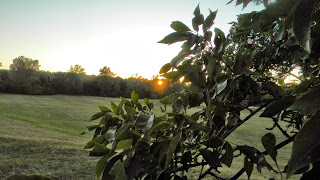A simple search for "survival guides" on Google can be a revealing journey. It is easy to find a few extreme alarmists who support all of their views with "scientific facts". In most cases, this is intended to scare the reader into buying the website's exclusive survival products. These sites have several negative effects on what I consider the need for common sense preparation. Several sites hawking survival equipment and guides lay out the imminent demise of our society, environment, public health, or basic utilities. Some people will become lethargic on the issue feeling as though they could do nothing to help themselves anyway. Others, take the opposite approach. They spend every free minute and spare penny on equipment and literature. A few of them even allow their obsession to consume their lives. I recommend some middle ground.
Regardless of where we live, our environment offers unique obstacles we must face everyday. Each of us have our own challenges; from tornado alley, to the coasts, to the deserts, to the icy north. This is before we take into consideration our man-made dangers. A car accident on the way to work, a week long power outage, or even just a media blackout can be devastating to some people. The trick is to be aware of what is possible, take steps to be prepared, and then live your life. Here is my guideline for common sense preparation.
Live Your Life
Regardless of where we live, our environment offers unique obstacles we must face everyday. Each of us have our own challenges; from tornado alley, to the coasts, to the deserts, to the icy north. This is before we take into consideration our man-made dangers. A car accident on the way to work, a week long power outage, or even just a media blackout can be devastating to some people. The trick is to be aware of what is possible, take steps to be prepared, and then live your life. Here is my guideline for common sense preparation.
- Educate Yourself
- Especially if you have moved to a new area, it is important to know the potential of your local weather. Those of us who need to be prepared for tornadoes, may not need to worry about drought. The National Weather Service can provide you all the information you need on the weather conditions in your area (both past and present).
- Know your local geography. In addition to knowing major roadways in your area, learn the little known side roads. Locate schools, parks, churches, and government buildings. These places are often used for public shelter during localized emergencies. While Google Maps is a good place to start, nothing beats getting out there and exploring your world with your own two eyes.
- Read up on what reliable sources have to say about what you need to be prepared. Try to stick to sites like the Red Cross or Ready.gov. Some people claiming to be common sense preppers are nothing but fearmongers.
- Take Action
- Don't wait for an emergency in your life to prepare for one. As recently as March 31, citizens of LA are seeing a rush on emergency supplies. By the time you need supplies, so will everyone else. Avoid empty grocery, home, and hardware store shelves. I keep a week's worth of supplies in my pantry. I have shelf stable food, bottled water, and hygiene products for everyone in my household.
- Keep emergency supplies in the car. If your car broke down in the bitter cold, could you wait hours for a tow? Keep an extra set of clothes, first aid kit, a couple snacks, maps, and a few basic tools in your car.
- Create emergency plans and evacuation routes for yourself and your loved ones. Practice these plans together and include the whole family. Don't forget to plan for an emergency when you are not together. Where will you meet? Include fire escape plans, how to react to a crime, and local emergency contacts.

- Once preparations are in place, it isn't difficult to maintain them. When expiration dates near, use the product and replace it.
- Keep in touch with current events. There is nothing worse in an emergency situation than not knowing what is going on around you. Many disasters are predictable, and can be simply waited out.
- Don't let fear of disaster dictate your life. I'm not going to hide in my wilderness bomb shelter with my decade worth of supplies waiting for the apocalypse. Above all use your own common sense. Only you know what you can afford, and what is right for you. Find the right balance for yourself between prepared and fanatical.































